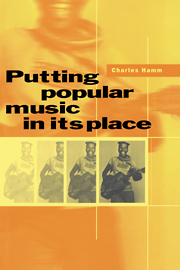Book contents
- Frontmatter
- Contents
- Acknowledgements
- Preface
- 1 Modernist narratives and popular music
- 2 Rock and the facts of life
- 3 Changing patterns in society and music: the US since World War II
- 4 “If I Were a Voice”: or, The Hutchinson Family and popular song as political and social protest
- 5 Some thoughts on the measurement of popularity in music
- 6 Elvis, a review
- 7 Home cooking and American soul in black South African popular music
- 8 Rock ‘n’ roll in a very strange society
- 9 African-American music, South Africa, and apartheid
- 10 “The constant companion of man”: Separate Development, Radio Bantu, and music
- 11 Privileging the moment of reception: music and radio in South Africa
- 12 Music and radio in the People's Republic of China
- 13 Towards a new reading of Gershwin
- 14 A blues for the ages
- 15 Graceland revisited
- 16 Dvořák in America: nationalism, racism, and national race
- 17 The last minstrel show?
- 18 The Role of Rock, a review
- 19 Genre, performance, and ideology in the early songs of Irving Berlin
- 20 Epilogue: John Cage revisited
- Index
Preface
Published online by Cambridge University Press: 05 February 2012
- Frontmatter
- Contents
- Acknowledgements
- Preface
- 1 Modernist narratives and popular music
- 2 Rock and the facts of life
- 3 Changing patterns in society and music: the US since World War II
- 4 “If I Were a Voice”: or, The Hutchinson Family and popular song as political and social protest
- 5 Some thoughts on the measurement of popularity in music
- 6 Elvis, a review
- 7 Home cooking and American soul in black South African popular music
- 8 Rock ‘n’ roll in a very strange society
- 9 African-American music, South Africa, and apartheid
- 10 “The constant companion of man”: Separate Development, Radio Bantu, and music
- 11 Privileging the moment of reception: music and radio in South Africa
- 12 Music and radio in the People's Republic of China
- 13 Towards a new reading of Gershwin
- 14 A blues for the ages
- 15 Graceland revisited
- 16 Dvořák in America: nationalism, racism, and national race
- 17 The last minstrel show?
- 18 The Role of Rock, a review
- 19 Genre, performance, and ideology in the early songs of Irving Berlin
- 20 Epilogue: John Cage revisited
- Index
Summary
This book contains a selection of my articles and reviews on the subject of popular music, written between 1970 and the present.
When I first tried to write about this subject, in the late 1960s, the world was changing in rapid and dramatic ways, and some popular music of the day seemed to be in tune with these changes. But I found that my academic training in historical musicology, a discipline proud of its tradition of humanistic positivism, was of limited use in dealing with this music and its place in the world.
My association with John Cage proved to be more useful. Even though Cage's music and aesthetics seem remote from and even antithetical to the sounds and environments of popular music, he was saying and doing things that helped make sense of whatever new world was emerging. No one was yet using the word “postmodern,” but Cage imagined a non-linear universe in which things simply existed, without the connecting tissue of cause and effect. His proto-postmodern aesthetic proposed that an uncountable number of different events take place, none of them privileged in significance or power over any others and none of them understandable from the perspective of a single dominant system of meaning. This is not rampant relativism, but rather an affirmation of the uniqueness and value of each happening.
- Type
- Chapter
- Information
- Putting Popular Music in its Place , pp. xi - xiiPublisher: Cambridge University PressPrint publication year: 1995

